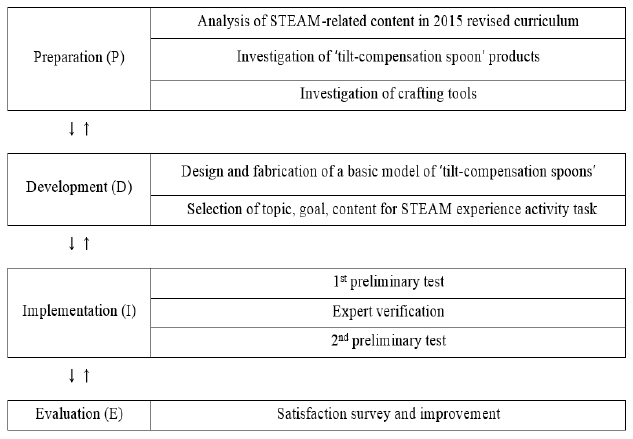Abstract
The purpose of this study is to develop a STEAM experience activity task that can be applied to middle school students as the theme of 'making and experiencing tilt-compensation spoons for the disabled'. This study was conducted through preparation, development, execution, and evaluation phases according to PDIE model. In the preparation phase, 2015 revised curriculum was analyzed in terms of STEAM education, tilt-compensation spoons released in markets were investigated, and physical computing tools and 3D modeling software required for model design were also explored. In the development phase, a spoon model having tilt-compensation function was designed so that middle school students could easily make it. A STEAM experience activity tasks based on this spoon model, class topics, goals, and contents, centered on STEAM education and disability awareness improvement education, were selected. In the implementation phase, the 1st preliminary test with eight 2nd-year students of a maker club in Seoul Y middle school for finding some problems of the STEAM experience activity task, and expert verification by technology teachers also performed for imrproving the task. And then, fifty 3rd-year students of same school were put into the 2nd preliminary test. As the result of expert verification, average 4.56 point(4.8 point each in class goal, interest, and understanding questions, and average 4.33 point in three relevance questions) was obtained on a 5-point scale. In the evaluation phase, from the student satisfaction survey on this STEAM experience activity task, average 4.14 point(4.29 point in interest, 4.35 point in understanding, and 3.99 point in relevance) was obtained on a 5-point scale. Reflecting the opinions obtained in the above processes, the STEAM experience activity task was revised and changed to 14-hour course. From the series of procedures and results, it is expected that this STEAM experience activity task with the theme of 'making and experiencing tilt-compensation spoons for the disabled' has a positive effect on the level of interest and awareness for the disabled and also improve the levels of interest and understanding of physical computing tools and 3D printing technology.
Figures & Tables

Fig. 1. Research procedure


